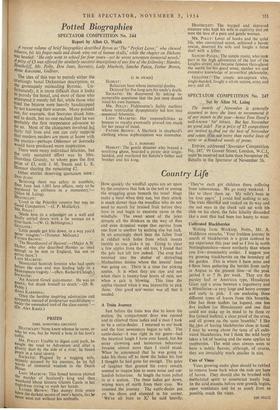Potted Biographies
recent volume of brief biographies described Byron as 'The "Perfect Lover," who chewed acco, bit his finger-nails and drank wine out of human skulls,' while the chapter on Dickens r headed: He only went to school for four years—yet he wrote seventeen immortal novels.' Prize of £5 was offered for similarly succinct descriptions of any five of the following: Hamlet, athcliff, Mr. Polly, Don Juan, Socrates, Lady Macbeth, Sancho Panza, Father Brown, na Karenina, Cru the for to att trit by ou fhe idea of this was to parody either the
[shingly banal Dickensian description, or
grotesquely misleading Byronic. Un- tunately, it is more difficult than it looks Parody the banal, and most of those who empted it merely fell flat, while those who the bizarre were heavily handicapped not knowing their sources. Many pointed t, for example, that Socrates drank him- r to death, but no one realised that he was *ably the first temperance advocate to so. Most of the characters involved led
rly full lives and one can only suppose that .modern readers are more at home with the exotics—perhaps Oblomov or Jorrocks Would have produced more inspiration. There were many individual felicities, but the only sustained effort was by Mrs. borothea Grundy, to whom goes the first Pr[ze of £3, with J. M. Swain and L. E. Honnor sharing the remaining £2. Other entries deserving quotation were : ,Other JUAN: 'Believing there was safety in numbers, bon Juan had 1,003 love affairs, only to be Murdered by celibates in a monastery.'— (Allan M. Laing).
:ATHCLIFF:
'Lived in the Priestley country but was no Good Companion.'—(J. P. Mullarky).
MR. POLLY:
'Made love to a schoolgirl on a wall and fi.nally settled down with a fat woman on a rIver-bank.'—(W. G. Bebbington.) GuLLIvta:
'Little people got him down, in a way you'd never imagine.'—(Terence Melican.)
FA ■ THER BROWN:
The Bloodhound of Heaven'.—(Major A.W. bicker, who also described Hamlet as 'mad enough to be sent to England, but not to arrive there.') Lan AA
ACBETH :
'Homicidal Scottish feminist who had spots before the eyes and was leading lady in a Shakespeare tragedy.'—(Rev. Richard Clough.) Sc
■ CRATES:
'An Ancient Greek quiz-master. He was an ascetic, but drank himself to dcath.'—(D. R. Peddy.)
ANNA KARENINA:
'Once the heroine inspiring admiration and Sympathy instead of proletarian watchfulness— today the unmasked tool of the class enemy.'— (Dr. Alex Kaatz.)
PRIZES
(MRS. DOROTHEA GRUNDY)
HEATHCLIFF: None knew whence he came, or Who he was, but he bored a hole in his love's
CCan.
MR. POLLY: Unable to digest cold pork, he Bought the road to Adventure and after a ghastly duel by the side of a river, he found Peace in a rural tavern. SOCRATES: Plagued by a nagging wife,
justly accused by his enemies, he let fall Words of immortal wisdom in the Death House.
LADY MACBETH: This famed hostess plotted
e murder of Scotland's king and then wandered hbout historic Glamis Castle in her nightdress trying to wash her hands.
k FATHER BROWN: This dumpy little priest 3eW the darkest secrets of men's hearts, but he ever went out without his umbrella.
HAMLET:
Reluctant hero whose immortal doubts Delayed for five long acts his uncle's death.
SOCRATES: He discovered by asking in- numerable questions that the just man should mind his own business.
Ma. PoLLv: Fishbournc's feeble outfitter whose vcntriculiar dyspepsiosity led him into arsonical .felonicity. LADY MACBETH: Her responsib:lities as hostess to royalty eventually proved too much for her peace of mind.
FATHER BROWN: A Sherlock in shepherd's clothing whose sophistication was innocence.
(L. E. HONNOR)
HAMLET: The gentle dreamer who braved a terrifying ghost, boarded a pirate ship single- handed, and murdered his fiancée's father and brother and his king.
HEATHCLIFF: The warped and depraved creature who kept his wife in captivity and yet won the love of a pure and gentle woman. Ma. Pony: Lover of books and the quiet life, who committed arson, achieved a heroic rescue, deserted his wife and fought a fierce duel with a killer.
SANCHO PANZA: The simple rustic, who took part in the high adventures of the last of the knights errant and became famous throughout the world for his good sense, mother wit and extensive knowledge of proverbial philosophy.
GULLIVER: The simple sea-captain who, single-handed, fought a whole nation, army and navy and all.


































































 Previous page
Previous page